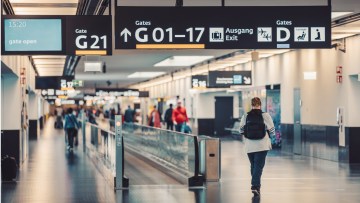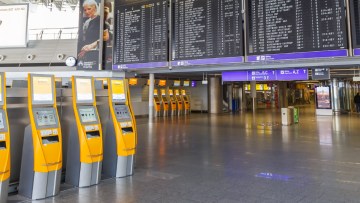Transport Hubs
The transport infrastructure covers a wide range of busy premises and facilities, each presenting their own challenges in terms of controlling rodents and insects. Integrated pest management centred around BASF treatment solutions is an effective way of maintaining a healthy, safe and pest-free environment.
Usual issues

Attractive sites for pests
Airport terminals and train stations are bustling places, used by thousands of passengers on a daily basis, many of whom will be eating and drinking and then discarding waste. The abundance of readily available food makes transport hubs a perfect setting for pests.
In transport terminals, ceilings, ducts, voids and walls that are hard for humans to reach pose no problem at all for pests in search of shelter.
Multiple access points
Transport terminals are large, generally open, public spaces. Pests can enter premises and vehicles in many different ways and then roam freely inside them. Passengers – and their pets – can also introduce pests in these areas, by carrying them in their luggage, on their clothing or on their pets’ fur.
Short turnaround times
Public transport systems and airlines operate on quick turnaround times in order to optimise passenger throughput and hence profitability. However, a quick turnaround can curtail the time spent by cleaning staff on monitoring the presence of pests. The pest management process is best left to trained professionals, who are used to working under time constraints, when they are fumigating cabins during turnaround, for instance.
Impact / risks
A health risk for travellers and staff
Pests such as rats, mice, cockroaches and flies are notorious for their filthy habits and their potential to spread unpleasant diseases. The problem is particularly acute in areas where food is served, often in small outlets dotted around transport terminals or as part of on-board services, which multiplies the chances of a growing pest infestation.
A wider public health risk
It’s a serious enough matter when a passenger or a member of staff becomes ill because of poor pest control. And yet, the hazards pests pose can easily spread much further afield. Travel companies don’t just transport goods and passengers, they may well be transporting pests as well. In fact, mass transit is one of the main factors blamed for the recent resurgence in Europe and America of bed bugs and the arrival of Asian tiger mosquitoes in Europe.
Costly structural damage
Rats and mice can easily chew through bus and train seating. Fixtures and fittings in transport terminals can be damaged too, as rodents grind down their constantly growing incisors.
An infestation of rodents in an airfield can also attract birds of prey seeking food, thus increasing risk of a bird strike, a rare incident but a major and very costly one.
Eating into profits
Food retailers and catering establishments operating in transport hubs regularly lose some of the food intended for sale to pests. Even vending machines can be raided by pests! The food they consume or contaminate translates into an automatic increase in operational costs for these businesses.
Reputational damage
Like many other sectors, the transport industry is not exempt from pests adversely impacting the reputation of your business, whether you operate a railway company, an airport or any other transport system. Sightings of pests, often relayed in social media, are enough to induce mistrust. Ultimately potential travellers may simply choose to avoid the services your business provides.
Legislation
Transport covers a broad range of organisations and facilities. Operators and facilities managers of transport-related businesses therefore need to contend with a wide raft of legislation intended to protect passengers and workers. In that context, pest control may not feature as the top priority in legislative compliance. And yet, infringement of such instruments as International Health Regulations set by the World health Organization in the shipping industry or the EU Food Hygiene Law, which applies to all catering outlets, could disrupt services.
Benefits to use BASF products

Effective control in complex environments
Pest controllers operating in stations, airports, transport vehicles, rolling stock etc. can rely on BASF pest control solutions as part of an integrated pest management strategy. BASF products are suited for use in these environments and easy and quick to apply, an important consideration in these busy and complex environments.
Effective control for health and safety
Facilities managers in the transport industry work with trained professionals, who provide their expertise and experience to help your operations stay free of pests. If an infestation occurs, you know that you can trust the BASF rodenticides and insecticides that your pest control contractor has selected, based on their proven track record.


